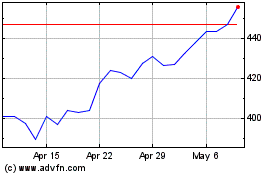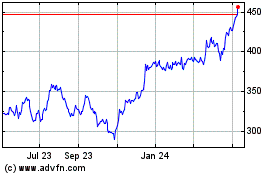Flash-storage company Pure Storage Inc. is set to price its
initial public offering at $17 a share, at the midpoint of its
expected range, according to people familiar with the deal.
At that price, the deal, which would raise $425 million by
selling 25 million shares, values the company at $3.1 billion. Pure
Storage had planned to offer 25 million shares at $16 to $18
apiece, according to regulatory filings. As of late Tuesday, the
pricing was not finalized and could still change pending
last-second discussions, the people familiar with the deal
said.
If the company trades higher when it makes its stock-market
debut on Wednesday, that, along with an in-range pricing, could
send a signal that a difficult summer for tech IPOs was an outlier,
and that investors are still willing to put money to work for
highly anticipated new companies.
However, if the market debut for the startup—valued at more than
$3 billion in a private fundraising according to the company—goes
poorly, investors say it will spark fears that there is a long
winter ahead, especially for the more than 120 private tech firms
valued at $1 billion or more.
"All eyes are on this deal to see what the tech IPO landscape
will be for the end of the year," said Kaylan Tildsley, a partner
at Triton Research LLC, which provides data and research on private
tech companies. The implications are particularly important because
"the backlog of private technology companies with the potential to
IPO is massive," she said before the Pure Storage IPO priced.
A spokeswoman for Pure Storage declined to comment.
There could be implications for the broader IPO market. Pure
Storage's IPO comes just ahead of two high-profile IPOs of large,
private-equity owned companies scheduled for next week:
payment-processing company First Data Corp. and supermarket
operator Albertsons Companies Inc.
Mountain View, Calif.-based Pure Storage's IPO comes on the
heels of the worst quarterly stock-market performance since 2011.
Investors pulled a net $46 billion out of U.S. stock funds in July
and August, according to the fund industry trade group Investment
Company Institute. Mutual funds and hedge funds alike posted
widespread losses in the third quarter. IPOs can be harder to pull
off amid skittishness from investors.
However, there could be a silver lining: Typically, when
hedge-fund performance stumbles, as is the case for many such funds
entering the fourth quarter, some will scramble to make up for
their losses. One way to do that is to invest in IPOs, which can
provide big, quick payoffs, often with returns that outpace the
broader market. If key deals fail to provide these expected pops,
however, hedge-fund money could exit the IPO market, market
participants say.
Already one IPO this month came at a price below the valuation
at which it last privately raised venture capital from investors:
medical-technology company NovoCure Ltd. Separately, on Tuesday,
mobile provider Digicel Group Ltd. said it canceled its planned IPO
citing current conditions, particularly in emerging markets.
Pricing below a private funding round is potentially problematic
for private investors, as it implies they overpaid for their
earlier investment. But for new investors in the IPO, it isn't such
a big deal, as long as the new shares rise in trading.
"I look at the opportunity, how much it's changing the market,
the size of the company, how it's changing the storage space," said
David Rudow, a senior equity analyst at Thrivent Asset Management,
who was considering buying into the offering early Tuesday. "For me
as a public investor with no exposure to private shares, it would
be a great deal for me if they actually price down from the last
round."
In 2015 there has been a dearth of technology company IPOs. Not
including Pure Storage, only 19 companies in the tech sector have
gone public so far this year, according to Dealogic, compared with
62 in all of 2014 and 48 in 2013.
At the same time, there is an increasing number of private
companies valued by venture firms at $1 billion or more that have
yet to tap the public markets. How a company like Pure Storage
fares in its IPO could affect their financing plans, some investors
say.
Pure Storage makes storage systems using flash-memory chips.
While its revenue is growing, its expenses, particularly for sales
and marketing, are also high, according to portfolio managers
looking at the company and the company's regulatory filings. The
company said in a regulatory filing that it hasn't achieved
profitability for any fiscal year since its inception in 2009.
Fans of the company, however, brush off those losses as
necessary for building the brand.
"When you're a private company it's all about market share,"
said Mr. Rudow, noting the money the company is spending is helpful
in grabbing such share.
Write to Corrie Driebusch at corrie.driebusch@wsj.com and Telis
Demos at telis.demos@wsj.com
Corrections & Amplifications: Pure Storage makes storage
systems using flash-memory chips. An earlier version of this
article incorrectly said Pure Storage makes flash-memory chips.
(Oct. 6)
Access Investor Kit for "Barclays Plc"
Visit
http://www.companyspotlight.com/partner?cp_code=P479&isin=GB0031348658
Access Investor Kit for "Barclays Plc"
Visit
http://www.companyspotlight.com/partner?cp_code=P479&isin=US06738E2046
Subscribe to WSJ: http://online.wsj.com?mod=djnwires
(END) Dow Jones Newswires
October 06, 2015 21:05 ET (01:05 GMT)
Copyright (c) 2015 Dow Jones & Company, Inc.
Goldman Sachs (NYSE:GS)
Historical Stock Chart
From Mar 2024 to Apr 2024

Goldman Sachs (NYSE:GS)
Historical Stock Chart
From Apr 2023 to Apr 2024
